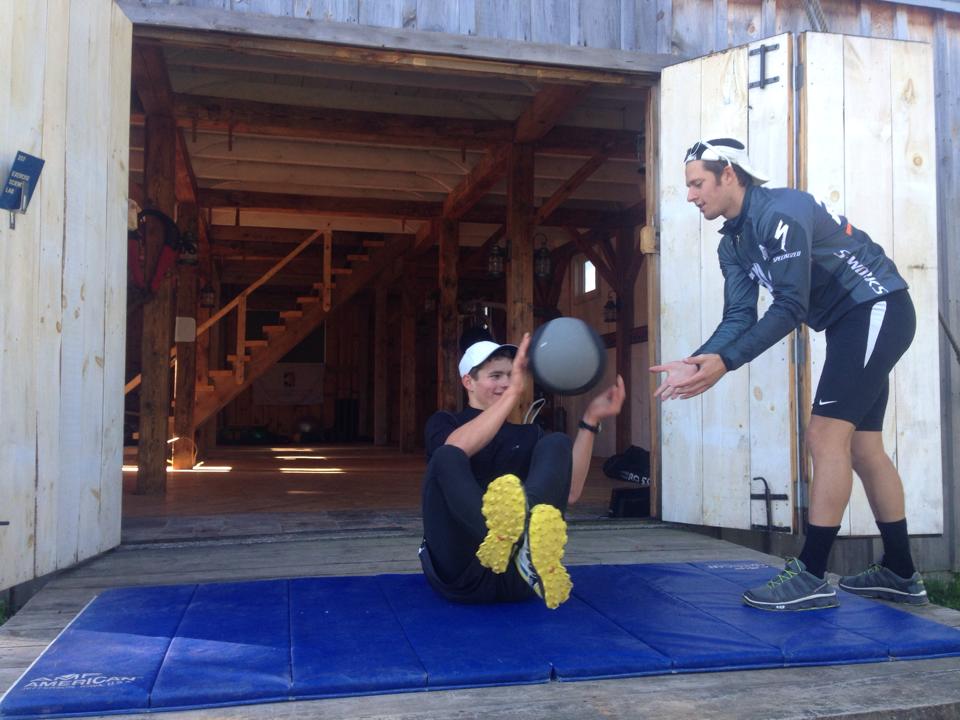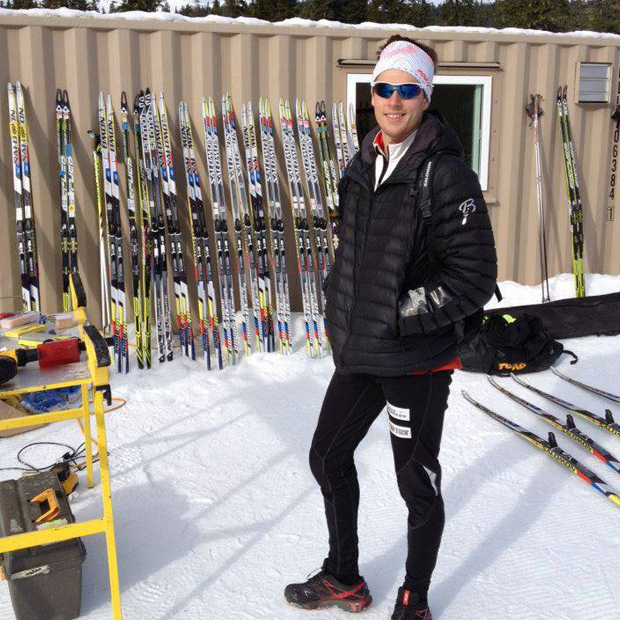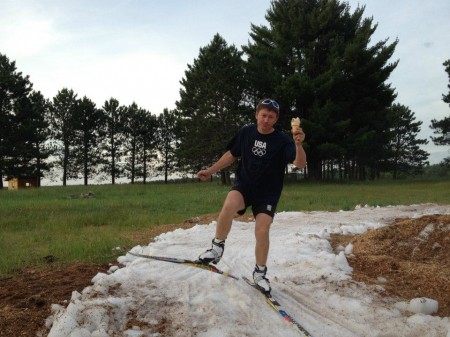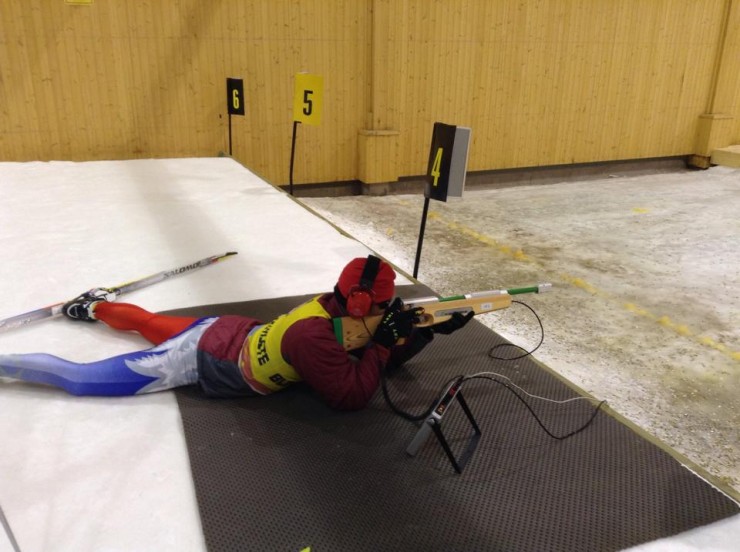
The newly appointed CXC Team Head Coach Andy Keller (r) operates on strength with postgrad Scott Harrison outdoors a barn near Cable, Wis. (Photo: CXC Skiing/Facebook)
3 years in the past, Andy Keller was a school kid hunting for an internship toward his physical exercise-science degree at Michigan Tech. He knew a lady, who knew Jason Cork, and he used the connection to land an apprenticeship at the Central Cross Country (CXC) Ski Association in Cable, Wis.
At the time, Cork was heading up the CXC Staff, which executive director Yuriy Gusev established in 2006 to support promising skiers striving for prime nationwide and worldwide performances. Keller, who grew up just outside Minneapolis in Chanhassen, Minn., became Cork’s intern assistant.

Andy Keller commenced as an intern, then an assistant, and finally a junior coach ahead of becoming promoted to CXC Team head coach this month, following the departure of Bill Pierce. (Photo: CXCnewsfeed.wordpress.com)
Months later, prior to Keller began his senior year, Gusev presented him a job.
“I explained, ‘I kind of want a degree so I’ll talk to you in a minor significantly less than a yr,’ ” Keller reflected on the phone last week.
He skied for four seasons at Michigan and graduated in 2012, then asking Gusev if there was still a spot for him. There was, even though Keller’s occupation title and responsibilities transformed 3 occasions ahead of he officially got started out, he mentioned.
1st, he was hired as sport-growth manager, tasked with connecting CXC to youth clubs and high-school packages in the Midwest. Then, CXC’s assistant coach Gus Kaeding left to head the Stratton Mountain School (SMS) elite group in Vermont. Cook necessary an assistant, and CXC’s board decided Keller would be it.
But ahead of that played out, Cork accepted a coaching position with the U.S. Ski Crew in the spring of 2012. Igor Badamshin became CXC Team head coach and Keller took on Badamshin’s prior function coaching juniors.
That initial yr, he worked alongside Badamshin.
“Then there was a tiny bit of [variation] with coaching designs and athletes on the crew, so Bill [Pierce] received brought on to perform alongside Igor [and] I took a lot more of a focused role to the junior plan,” Keller said of final season. “This 12 months began off the identical way … I was targeted much more on the junior system.”
For the following numerous months, Badamshin oversaw the system and Pierce worked as the elite head coach. In late January, Badamshin died unexpectedly of a heart assault although skiing the Birkie trail in between Cable and Hayward, Wis. He was 47, and his passing left CXC and the surrounding local community stunned.
“A guy that performs his ass off and is ready to do something for his program … his passion really lied with functioning with athletes,” Keller reflected. “[I] was just attempting to carry on his legacy — inspiring little ones to ski and receiving them thrilled to be out there. If there’s one issue he was great at, it was undoubtedly that, and also carrying on his operate ethic. The man wouldn’t complain. He’d be out there skiing 50 k and waxing…
“There was undoubtedly big shoes to fill when he passed away,” CXC Team’s new head coach continued. “As I’ve come by means of, I’ve been doing work below a ton of coaches my philosophy is I can always understand some thing. When I was interning underneath Jason and Gus that was what I loved to do — studying and pay attention.”
“There was undoubtedly large shoes to fill when [Badamshin] passed away. … As I’ve come via, I’ve been operating under a ton of coaches my philosophy is I can usually discover something.” – Andy Keller, CXC Staff Head Coach as of September 2014
Keller Becomes Head Coach
That is correct, Keller, in his third season as a CXC coach, was not too long ago promoted to head of its elite staff following Pierce’s selection to accept a task in Colorado (he’s turning out to be nordic director of the Snow Mountain Ranch YMCA near Winter Park this fall) earlier this month.
But “elite” is a term Gusev and several other U.S. nordic directors like to stay away from: it is about growth and assisting athletes reach their increased-competitors objectives. The CXC Crew grew to become Staff Vertical Limit in 2009 as element of a sponsorship deal, and a 12 months later it had 18 athletes, like a couple Olympians (Garrott Kuzzy and Caitlin Compton — now Caitlin Gregg).
The New: 2014/2015 CXC Staff
CXC Group:
- Cory Ellertson
- Bjorn Batdorf
- Bill Bowler
- Chris Pappathopoulos
- Hilary Patzer
- Andrew Brown
- Scott Johanik
- Natalia Naryshkina (lives in Russia, strategies to compete in western SuperTours and U.S. nationals)
Postgrads: (living in Cable this fall/winter)
- Scott Harrison
- Sam Boardman
University Summer time Residency Group:
- Nichole Bathe (University of Alaska Fairbanks)
- Nicolette Reker (now at Winona State University, competing for CXC Staff)
- Tom Bye (Postgrad final 12 months, now at Michigan Tech)
- Thomas Kendrick (Michigan Tech)
- Will Frielinghaus (St. Lawrence University)
- Seth Mares (Gogebic Community College, strategies to transfer to Michigan Tech)
International Instruction Companion:
- Leandro Lutz (living in Cable this fall, plans to travel to Europe for international races in an attempt to qualify for World Championships might keep in Cable and race U.S. circuit)
The CXC Group presently has eight members, most of which will be focused on prime-ten outcomes in Midwest marathons to entice sponsors. In addition, Keller is overseeing two postgrads, about 10 juniors and an international guest skier.
“All the coaches agreed, the crew requirements to get back to the roots of building athletes,” Gusev explained on the phone. “You would have in no way referred to as our crew the CXC Elite Group, it just came later on when this word grew to become extremely well-liked.
“We always see our crew as a development device for that higher step,” he extra. “We do not see this team as full of stars, but we want to have a crew open to athletes of that level. If it can help them great … It’s just like having a little one: at some stage you need to let them go and see if they can stand on their feet.”
Taking into consideration that, Gusev is encouraged by the direction his system is headed, specially with a homegrown coach at the helm.
“It’s interesting to see somebody who went by way of the authentic pipeline and grew to become a coach,” he mentioned. “And that’s a objective from the time he utilized from an internship.”
Nevertheless, the last couple of weeks — and months — have been busy at CXC, to say the least. Following Badamshin’s passing, Gusev explained the organization interviewed a couple people to employ in his absence, but eventually, Pierce and Keller stepped up and mentioned they could dealt with the extra responsibilities without another coach.
“It was possibly far more emotional for some of us, but you just move on,” Gusev explained. “The plans essential to move on as nicely and … we had to change proper away.”
It didn’t get extended for everybody to get back “in the groove,” he extra. Pierce continued to serve as head coach and Keller as his assistant and junior coach.
Final Friday, Keller drove 300 miles southeast to Madison to test about 10 juniors at a weekend camp at CXC’s administrative headquarters. The group meets about after a month in different places, holding camps with other Midwest clubs, like Loppet Nordic Racing (LNR), May possibly by way of December, Keller explained.
He also helps host month to month CXC master’s camps, and while he’s not scheduled for each and every single 1, he led a recent camp under Pierce’s guidance earlier this month.
“I produced Andy run in excess of half the sessions, and I watched him and helped him a tiny bit,” Pierce mentioned. Then he informed him and the rest of CXC about his determination to depart.
“I saw it coming,” Keller reflected. “Bill did speak to me as he found out much more about the new place he was taking.”
In Cable, the place Keller lives in a condominium on the Telemark residence, he spent the summer season operating with 6 athletes in CXC’s new school summer season residency system, which Pierce initiated.
“That overlapped with what you would call our team now, much more of a marathon team,” Keller stated of his prior and existing responsibilities, coaching juniors and now seniors as nicely. “The athletes that we’ll have competing on the SuperTour is reasonably modest.”
Those skiers include two postgrads from LNR — Scott Harrison and Sam Boardman — who plan to reside and train full time in Cable this fall and winter. Their major races include western SuperTours, U.S. nationals, and the Midwest Junior National qualifiers .
“We really do not see this team as total of stars, but we want to have a crew open to athletes of that level. … It’s just like having a youngster: at some point you need to allow them go and see if they can stand on their feet.” — CXC Executive Director Yuriy Gusev
With an total emphasis on regional competitions, CXC is seeking to assemble the ideal skiers in the Midwest.
The Outdated: What took place to final season’s CXC Team?
Not returning: Karl Nygren, Eric Wolcott, Dmitriy Ozerski (was flying back-and-forth from Russia for races)
With a single returner from last year’s CXC Team (school skier Tom Bye), Keller explained what took place:
“When Igor [Badamshin] took over there was minor bit of communication problems … a minor bit of discontent,” he explained. Athletes like Karl Nygren, who might have had as many as five coaching adjustments in seven many years, in the long run determined to depart the system.
“If there’s something the system requirements is some stability,” Keller stated.
“As the coach now, I’d really like to construct the plan back up to how it was when I interned,” he explained, referencing past CXC standouts like Jessie Diggins, Caitlin Gregg, Brian Gregg, and Jennie Bender. “…That was the yr they won the NNF Cup so that is the level I’d like to carry it back to.”
One of Gusev’s priorities is employing an additional coach focused on sport advancement to further connect CXC with grassroots organizations and schools throughout the central U.S. Seeking at the large image, it is about marketing the sport and coaching development. In the extended run, CXC is hoping that will translate into athlete retention.
“Regardless whether the athletes come to us immediately or not … it’s a matter of regardless of whether we have constant, effortless to follow progressions, like soccer does or swimming does,” Gusev mentioned of two sports activities he considers domestic successes in the U.S. “[Those sports activities outline the] actions to substantial school, university and beyond, which doesn’t exist genuinely in cross-country skiing. We have all the pieces in location, and we can talk that to mothers and fathers.”
For Keller, his objective is to aid expand the base and aggressive nature of skiers in the Midwest, which contains Illinois, Indiana, Iowa, Kansas, Michigan, Minnesota, Missouri, Nebraska, North Dakota, Ohio, South Dakota, and Wisconsin.
“It’s the place I grew up,” he said. “[We’re] striving to make the Midwest a lot more of a ski powerhouse, and that’s certainly occurring. We’re creating athletes, but we’re obtaining a difficult time obtaining them to keep close to.”
He counted eight skiers in elite programs outside their region, including Jessie Diggins (SMST2), Anne Hart (SMST2), Ben Saxton (SMST2), Gordon Vermeer (Craftsbury Green Racing Task), and Rosie Frankowski (Alaska Pacific University).
“It seems like everyone wants to go someplace else and I’ve received to figure out why,” Keller stated. “I believe the degree of help CXC offers is between the greatest … It’s just we’re not in the mountains and we do not have a glacier to [train on]…
“The Midwest might not be the most sexy training internet site as a Sun Valley or some thing like that,” he continued. “… [But] it is not that we’re not making the athletes.”
“It appears like everybody wants to go somewhere else and I’ve got to figure out why. I feel the level of help CXC gives is between the best … It is just we’re not in the mountains and we really do not have a glacier to [train on]…” – Keller
In terms of coaching styles, Keller mentioned he acquired a good deal from functioning with Cork, Kaeding, Pierce, and Badamshin.

Coach Igor Badamshin having some entertaining on a number of patches of snow. Photograph is titled “Snowflakes, ice cream and Igor,” by former CXC Staff elite coach Bill Pierce. Badamshin was the CXC system head coach right up until his unexpected death in January 2014. (Photo: cxcnewsfeed.wordpress.com)
“I’d hope I’d be perhaps as analytical [as Cork],” he said. “I’m hoping I can be half as enthusiastic and motivating as Igor … I consider to pull from all these guys and find out what functions for myself and what doesn’t match my character. I would say I’m reasonably soft-spoken and sometimes it is a tiny bit more difficult for me to place myself out there. I hope I’ve gotten much better at that.”
When it comes to managing athletes, Pierce will continue to compose education plans for those that began with him at the beginning of the season, including Cory Ellertson, Chris Pappathopoulos, Andrew Brown, and Scott Johanik.
Keller explained he’ll get on individuals that joined the group a lot more lately and will be in Cable the up coming a number of months: the two postgrads and guest skier Leandro Lutz from Brazil, who plans to travel to Europe to try out to qualify for 2015 Planet Championships.
As for coaching and waxing for 18 or so skiers all through the season, Keller stated that doing work alongside other Midwest clubs at races, especially at principal occasions like U.S. nationals, ought to assist. And not all the athletes will compete at the same occasions, given their varied focuses — from marathons to junior-qualifying races.
At the exact same time, Keller said he’s hunting forward to getting an assistant or some variety of helper in the potential. Gusev mentioned the new retain the services of would largely aid with junior camps.
In the final month since Pierce’s choice, he said he’d been doing work with Keller on the transition and will proceed to supply assistance past his last day at the end of September.

CXC Group’s fall/winter crew throughout a latest workout in Cable, with postgrads Scott Harrison and Sam Boardman, and guest skier Leandro Lutz from Brazil, who will be joining the staff for the next couple months. (Photo: CXC Skiing/Facebook)
“I’ve essentially offered [Keller] my every day responsibilities,” Pierce mentioned earlier this month. That incorporated even the small things, like “teaching him how to smooth out a trail and pick rocks and seeds.”
“There’s definitely a great deal to catch up on as far as ski variety and things like that,” Keller observed. “Working with Rossignol, getting in get in touch with with individuals guys, acquiring up to pace with things Bill might’ve taken care of as far as a crew factor and receiving [ready] to compete.”
He’s also tasked with attracting sponsors through prime results in Midwest marathons.
“We’ll do fine with that,” he stated of his mostly marathon-targeted crew. “Our postgrads have goals of trying to make World Juniors … certainly a large one particular is qualifying for Junior Nationals and attempting to make prime-20 [there]. The objectives for the marathon staff is currently being on the podium or best ten … that must be no dilemma.”
He’d also like to deliver the CXC Staff back to an “elite, elite” team, he explained, by recruiting latest graduates.

CXC Para Nordic Group member Steve Baskis coaching with U.S. Paralympics Nordic System in the ski tunnel in Torsby, Sweden, earlier this month. (Photograph: CXC Skiing/Facebook)
In accordance to Gusev and CXC’s mission statement, the two,000-member organization has 4 easy goals: to develop its base, advertise the sport, achieve aggressive accomplishment, and generate partnerships through collaborations. The way he sees it, member athletes are portion of that as well.
“[The CXC Group] athletes are in a community to be motivation to adult athletes at clinics, to be role designs and whatever else comes with it,” Gusev explained. “With aggressive excellence, we hope to get them to the level [of a person like Garrott Kuzzy or Tad Elliott, who manufactured the U.S. Ski Team]. We hope the athletes that come by way of our system will at some point contribute to worldwide success…”
Emerging Adaptive Group
CXC is also focused on constructing its adaptive system underneath coach Andrew Poffenberger, yet another Minnesota native who skied as a junior and studied well being fitness at Gustavus Adolphus University in St. Peter, Minn.
- Steve Baskis (blind athlete, veteran)
- Aaron Pike (sit-skier, 2014 Paralympian)
- Travis Dodson (sit-skier, Veteran, 2014 Paralympian)
- Augusto “Goose” Perez (sit-skier, cancer survivor, 2014 Paralympian)
- John Oman (standing athlete, 2014 Paralympian)
“Emerging Talent” System:
This 12 months, the CXC Para Group has expanded to incorporate five elite athletes, 4 of which went to the 2014 Sochi Paralympics: Aaron Pike, Travis Dodson, Augusto “Goose” Perez, and John Oman. Its fifth member, Steve Baskis, a blind athlete and veteran, recently joined the U.S. Paralympics Nordic Crew at an on-snow camp in Sweden.
Poffenberger also performs with 3 “emerging talent” adaptive skiers — individuals “who have attempted nordic skiing on numerous occasions and show promise, curiosity in competitors, and dedication to the sport,” he explained in an e-mail.
In addition, he coaches about four or five junior-improvement skiers, athletes that “can sit ski for ten to 15 k in a session,” Gusev said. “Andrew’s completed an amazing task with them.”
“Ideally we would like to mirror the development structure of able-bodied skiing,” Poffenberger explained. “Possibly the most critical component of that construction is youth improvement. If we assume to be aggressive at the highest level, we need to have to start establishing younger athletes.”
Amongst their efforts: CXC has submitted a proposal to consist of adaptive nordic at the Wisconsin state meet.
“We are also in search of out coaches who are prepared and capable to coach adaptive nordic skiing at the substantial school level,” he extra.
Final week, Poffenberger attended a conference with The United States Association of Blind Athletes at the Olympic Instruction Center in Colorado Springs.
“I enjoy functioning with these athletes because they have standpoint of the total picture, and don’t allow modest factors stand in their way,” he stated, now in his 2nd season with the team.
“I hope we can preserve possessing much more and much more folks like [Poffenberger and Keller] that get concerned with a sport as a profession,” Gusev said. “They understand the way athletes move from one particular stage to another stage and it is less complicated for them to communicate with athletes at the younger level what expectations are. That’s actually the goal.”